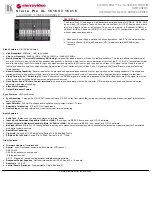
tcpdump
Enable a TCP dump for CPU-bound traffic on the Control and Router Processors..
Z9500
Syntax
tcpdump {cp | rp} [capture-duration
time
| filter
expression
|
max-file-count
value
| packet-count
value
| snap-length
value
|
write-to
path
]
To disable the TCP dump, use the
no tcpdump
command.
Parameters
cp
Enter the keyword
cp
to perform a dump on traffic
processed by the Control Processor CPU.
rp
Enter the keyword
rp
to perform a dump on traffic
processed by the Route Processor CPU.
capture-
duration
Enter the time for packet capturing. The timer begins as
soon as the command is enabled. The range is 20 to 9000
seconds.
filter
Specify the packet that will be dumped. If no filter is entered,
all packets are dumped. Filter expressions usually consist of
an id (name or num ber) preceded by one or more qualifiers.
There are three different kinds of qualifier: type, direction, or
protocol.
Enclose the filter option with double quotes: “port 20.” The
range is 1 to 100 characters.
max-file-count
Enter the maximum number of 1MB files. The maximum file
size for a TCP dump capture is 1MB. When a file reaches
1MB, a new file is created, up to the specified number. The
range is 1 to 20.
packet-count
Enter the number of packets to capture. The counter begins
as soon as the command is enabled. The range is 10 to
150000.
snap-length
Enter the number of bytes per packet to capture. Use this
option to reduce the size of the captured packets, to capture
only the needed headers and avoid rest of the data portion
of the packet. The range is 0 to 1200.
write-to
Enter the location to save the captured packets. Files can be
saved to flash, to FTP, SCP, or TFTP:
•
flash://filepath
•
ftp://userid:password@hostip/filepath
•
scp://userid:password@hostip/filepath
•
tftp://hostip/filepath
700
Debugging and Diagnostics
















































